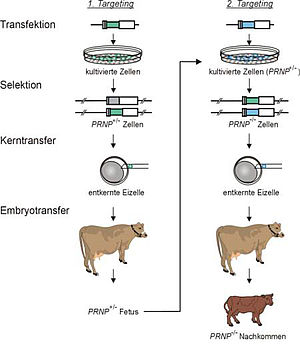FORPRION
BAYERISCHER FORSCHUNGSVERBUND PRIONEN

LMU 22 Generierung von PrPC defizienten Rindern ( Prnp 0/0 Rinder)
Arbeitsfeld:
Genetik der PrionkrankheitenThis project aimed at the generation of cattle lacking PrPC expression. Targeted inactivation of the PRNP gene was achieved in primary fetal fibroblasts using a promoter trap vector in which the entire coding sequence for PrPC was replaced by a promoter-less neomycin resistance gene. Targeted cells were used for nuclear transfer cloning to produce PRNP+/- fetuses. From those, fibroblasts were established in which the second PRNP allele was targeted using the same targeting strategy, but with a promoter-less hygromycin resistance gene. PRNP-/- cells were then used for nuclear transfer to produce PrPC-deficient fetuses and offspring. These cattle are important for (i) evaluation the physiological functions of PrPC in bovine; (ii) clarifying the role of PrPC in the pathogenesis of BSE; and – if PrPC turns out to be essential for BSE infection - (iii) safe production of biophamaceutical products in transgenic cattle. In the funding period the following goals have been achieved: (i) selection of a primary culture of fetal fibroblast which are suitable for nuclear transfer and exhibits sufficiently high PRNP expression for a promoter trap strategy (ii) construction of targeting vectors for PRNP (iii) optimization of a transfection protocol and selection strategy for PRNP targeting (iv) generation of PRNP targeted fetal fibroblast clones (v) production of nuclear transfer embryos from PRNP targeted fetal fibroblasts (vi) initiation of pregnancies from these cloned embryos and recovery of PrPC-deficient fetuses. Unfortunately, so far all PrPC-deficient fetuses were aborted before the fourth month of pregnancy. In the meantime, a US team has demonstrated, that PrPC-deficient fetuses and offspring can develop normally (Richt et al., Nat. Biotechnol. 25: 132-8, 2007). Thus, we assume that the PRNP mutant fetal fibroblasts generated in our lab accumulated damage during transfection and/or selection, reducing their potential for nuclear transfer. The fact that at the same time we were able to clone GFP transgenic cattle from lentiviral transduced fibroblasts (Hofmann et al., Biol. Reprod. 71: 405-409, 2004) as well as transgenic cattle expressing a bispecific antibody for tumor therapy from transfected fetal fibroblasts (Grosse-Hovest et al., Proc. Natl. Acad. Sci. USA 101: 6858-6863, 2004), demonstrates, that there is no general problem regarding nuclear transfer transgenesis in our lab. In the meanwhile, we started new transfections of other primary cells with the PRNP knockout vector, and we will continue the project beyond the funding period. In spite of the previous publication by the US team, having PrPC-deficient cattle on the genetic background which is most frequently used in Bavaria (Deutsches Fleckvieh) would still be very interesting.




